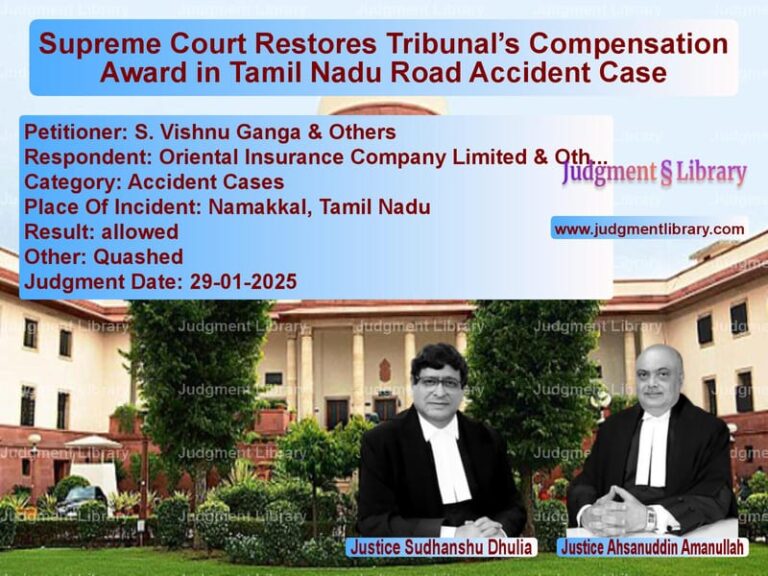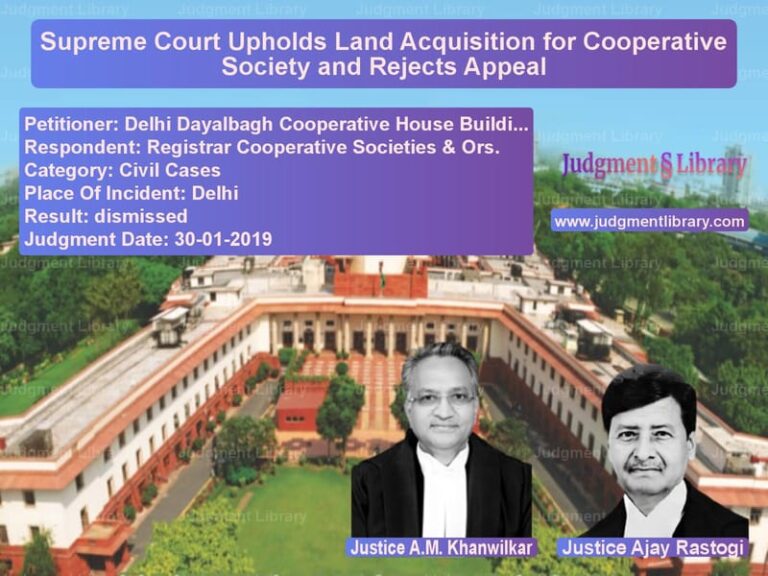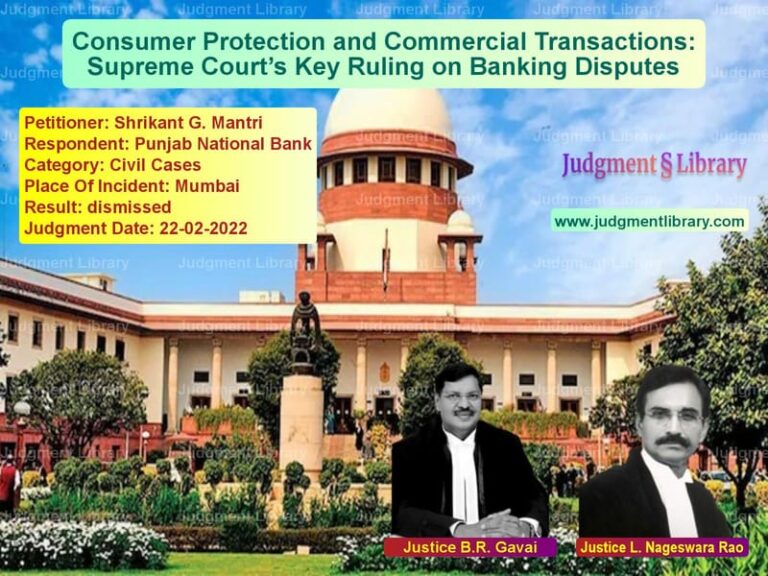Supreme Court’s Ruling on Afjal Ansari’s Conviction: Impact on Political Disqualification and Legal Precedents
The case of Afjal Ansari vs. State of Uttar Pradesh revolves around a crucial legal and political issue concerning the disqualification of elected representatives due to criminal convictions. This Supreme Court ruling addressed whether the conviction of a Member of Parliament (MP) under the Uttar Pradesh Gangsters and Anti-Social Activities (Prevention) Act, 1986 (UP Gangsters Act) should be stayed to prevent disqualification under the Representation of the People Act, 1951 (RPA).
The Supreme Court had to decide whether a conviction under the Gangsters Act should lead to automatic disqualification, whether an MP should be allowed to continue serving despite a conviction, and whether the stay of conviction should be granted based on its legal and political consequences.
Background of the Case
Afjal Ansari, a Member of Parliament from Ghazipur, Uttar Pradesh, was convicted by the Trial Court under Section 3(1) of the UP Gangsters Act. He was sentenced to four years of simple imprisonment along with a fine of ₹1,00,000. Following his conviction, the Lok Sabha Secretariat disqualified him under Section 8(3) of the Representation of the People Act, which disqualifies a person sentenced to two or more years from holding public office and contesting elections for six years after release.
Ansari challenged his conviction and sought a stay on it under Section 389(1) of the Code of Criminal Procedure (CrPC) in the Allahabad High Court. The High Court granted bail but declined to stay his conviction, leading to his disqualification. He then appealed to the Supreme Court, seeking relief.
Arguments of the Parties
Arguments by Afjal Ansari
Dr. Abhishek Manu Singhvi, representing Ansari, argued:
- The conviction should be stayed because it would cause irreversible consequences, such as disqualification from Parliament and barring him from contesting elections for the next ten years.
- The verdict impacts not just the MP but also his electorate, depriving Ghazipur of representation in Parliament.
- The UP Gangsters Act was wrongly applied to him since the only case cited in the gang chart had already resulted in his acquittal.
- He had been an elected representative for several terms without any previous convictions.
- The case did not involve serious crimes like murder, extortion, or corruption, which would justify stringent action.
Arguments by the State of Uttar Pradesh
Additional Solicitor General K.M. Nataraj, appearing for the State, argued:
- The conviction was under a law meant to curb organized crime, and staying it would send a wrong message.
- Section 8 of the RPA applies automatically upon conviction, and courts should not interfere in political disqualifications unless there are exceptional circumstances.
- Allowing a convicted MP to serve would undermine public trust in the justice system.
- The right to contest elections is not a fundamental right but a statutory one, and courts should not dilute the effect of electoral laws.
Supreme Court’s Observations
The Supreme Court carefully examined the legal and constitutional aspects of the case. Key observations included:
1. Application of the Representation of the People Act
The Court reiterated that disqualification under Section 8(3) of the RPA is triggered automatically upon conviction, and it is not for the courts to alter the legislative intent unless compelling circumstances exist.
Read also: https://judgmentlibrary.com/supreme-court-ruling-on-food-safety-act-and-misbranding-charges/
2. Legal Standard for Staying Convictions
The Court noted that staying a conviction is an exception, not the rule. It should only be granted in rare cases where the conviction is manifestly unjust or likely to be overturned.
3. Impact on Representation
While the Court acknowledged that Ghazipur would remain unrepresented, it held that parliamentary representation is subject to legal disqualifications, and the electorate’s interests must align with constitutional principles.
4. Precedents on Political Disqualifications
The Court cited previous cases, including Lok Prahari v. Election Commission of India, where it was held that conviction-based disqualifications serve the purpose of keeping criminal elements out of politics.
Final Judgment
The Supreme Court ruled:
“The conviction under Section 3(1) of the UP Gangsters Act is upheld, and the appellant has failed to demonstrate exceptional circumstances warranting a stay. The disqualification under Section 8(3) of the RPA remains in force.”
Read also: https://judgmentlibrary.com/supreme-court-acquits-accused-in-murder-case-due-to-lack-of-evidence-2/
However, the Court made a crucial modification:
- The Ghazipur Parliamentary seat will not be notified for bye-elections until the High Court decides Ansari’s appeal.
- Ansari will not be entitled to participate in Lok Sabha proceedings or receive any MP benefits.
- He is allowed to contest future elections if his conviction is overturned.
- The High Court is directed to expedite the appeal hearing before June 30, 2024.
Impact of the Judgment
The ruling has far-reaching consequences:
1. Clarity on Disqualification Rules
The judgment reaffirms that conviction-based disqualifications are strictly enforced, and only extraordinary cases justify relief.
2. Implications for Politicians Facing Criminal Charges
The verdict sets a precedent that MPs and MLAs convicted of serious offenses will not be shielded from the consequences of their actions.
3. Role of the Judiciary in Political Matters
The ruling maintains the principle that courts should not interfere in electoral disqualifications unless there is a clear miscarriage of justice.
4. Future of Electoral Reforms
The case highlights the need for a broader debate on electoral reforms and the issue of criminalization in politics.
Conclusion
The Supreme Court’s decision in Afjal Ansari vs. State of UP sets an important precedent on the relationship between criminal convictions and political disqualifications. By upholding the legal framework under the RPA, the Court reinforces the integrity of electoral laws while allowing due process for the appellant’s appeal. This judgment will serve as a guiding principle for future cases involving disqualification of elected representatives due to criminal convictions.
Petitioner Name: Afjal Ansari.Respondent Name: State of Uttar Pradesh.Judgment By: Justice Surya Kant, Justice Ujjal Bhuyan, Justice Dipankar Datta.Place Of Incident: Ghazipur, Uttar Pradesh.Judgment Date: 13-12-2023.
Don’t miss out on the full details! Download the complete judgment in PDF format below and gain valuable insights instantly!
Download Judgment: afjal-ansari-vs-state-of-uttar-prade-supreme-court-of-india-judgment-dated-13-12-2023.pdf
Directly Download Judgment: Directly download this Judgment
See all petitions in Bail and Anticipatory Bail
See all petitions in Judgment by Surya Kant
See all petitions in Judgment by Ujjal Bhuyan
See all petitions in Judgment by Dipankar Datta
See all petitions in dismissed
See all petitions in supreme court of India judgments December 2023
See all petitions in 2023 judgments
See all posts in Criminal Cases Category
See all allowed petitions in Criminal Cases Category
See all Dismissed petitions in Criminal Cases Category
See all partially allowed petitions in Criminal Cases Category







